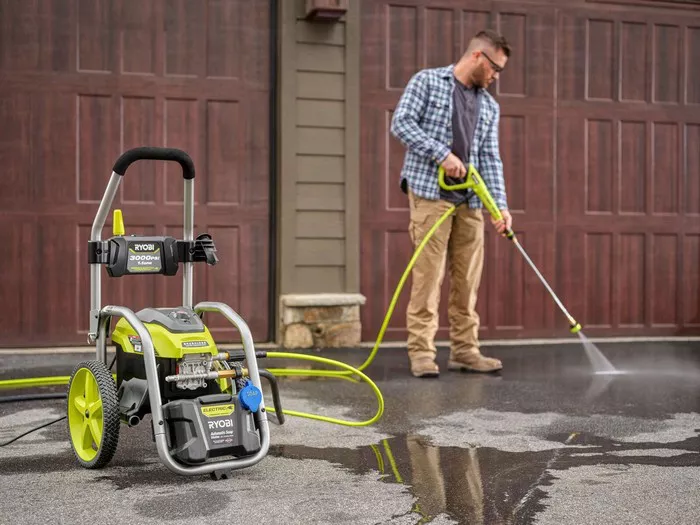When it comes to cleaning tough stains and grime in our homes, many people wonder about the effectiveness of pressure washers. These powerful tools are designed for heavy-duty outdoor cleaning tasks, but can they be used indoors, particularly in places like the bathroom? This article will explore the pros and cons of using a pressure washer to clean your bathroom. We will also discuss alternative methods for maintaining bathroom cleanliness.
Understanding Pressure Washers
What Is a Pressure Washer?
A pressure washer is a high-powered cleaning device that uses a motor to pump water through a hose at high pressure. This force can effectively remove dirt, mold, mildew, and other stubborn residues from various surfaces. Pressure washers are commonly used for outdoor tasks like cleaning driveways, decks, and siding. However, their high-pressure streams can pose risks if misused indoors.
How Does It Work?
Pressure washers function by drawing water from a source, usually a garden hose, and then pressurizing it through a nozzle. This results in a powerful jet of water that can clean surfaces quickly and effectively. Most pressure washers come with adjustable nozzles, allowing users to switch between different spray patterns. This feature is essential when considering different cleaning tasks.
Benefits of Using a Pressure Washer
Fast and Efficient Cleaning
One of the most significant advantages of using a pressure washer is speed. The high-pressure water stream can cut through grime and dirt much faster than traditional cleaning methods. For large surface areas, this can save time and effort.
Effective Stain Removal
Pressure washers excel at removing tough stains, particularly those caused by mold, mildew, and rust. The concentrated water jet can dislodge these stains, making it easier to achieve a clean surface.
Chemical-Free Cleaning
Using a pressure washer often eliminates the need for harsh chemicals. The force of the water alone can tackle many stains, making it a more environmentally friendly option. This is especially beneficial for those with allergies or sensitivities to cleaning products.
Drawbacks of Using a Pressure Washer Indoors
Potential Damage to Surfaces
While pressure washers are effective, they can also cause damage if not used correctly. The high pressure can strip paint, damage tiles, and even loosen grout in bathrooms. For delicate surfaces like painted walls or fragile tiles, this can be a significant concern.
Water Damage Risks
Bathrooms are designed to handle moisture, but introducing high-pressure water jets can lead to unintended water damage. Excess water can seep into areas where it shouldn’t be, leading to mold growth, structural damage, and other problems. Proper ventilation is crucial if you choose to use a pressure washer indoors.
Safety Hazards
Using a pressure washer in a confined space like a bathroom poses safety risks. The high-pressure water can create slippery surfaces, increasing the likelihood of slips and falls. Additionally, electric pressure washers can pose electrical hazards if not used carefully around water.
Preparing for the Task
Evaluate the Bathroom
Before deciding to use a pressure washer, assess the condition of your bathroom. Take note of the materials used for walls, floors, and fixtures. If your bathroom has delicate finishes or older materials, it may be best to avoid using a pressure washer altogether.
Choose the Right Equipment
If you decide to proceed, choose a pressure washer with adjustable pressure settings. A model with a lower PSI (pounds per square inch) setting is preferable for indoor use. This allows for a gentler spray that can reduce the risk of damage to surfaces.
Clear the Area
Make sure to remove any items from the bathroom that could be damaged or interfere with the cleaning process. This includes towels, rugs, and personal items. Additionally, ensure that the bathroom is well-ventilated to avoid moisture buildup.
see also: What is the Cost to Power Wash a Deck?
Alternative Cleaning Methods
Traditional Cleaning Solutions
For most bathroom cleaning tasks, traditional methods may be more appropriate. Using a combination of hot water, soap, and a scrub brush can effectively remove grime and stains without the risks associated with pressure washing.
Steam Cleaners
Steam cleaners are an excellent alternative for cleaning bathrooms. They use hot steam to sanitize and remove dirt, killing bacteria and mold without harsh chemicals. Steam cleaners are generally safer for indoor use and can effectively clean a variety of surfaces.
Baking Soda and Vinegar
A mixture of baking soda and vinegar can work wonders in a bathroom. This combination can break down grime, deodorize surfaces, and leave your bathroom smelling fresh. It is safe for most surfaces and poses no risk of damage.
When to Consider a Pressure Washer
Outdoor Use
While using a pressure washer indoors may not be advisable, it can be beneficial for outdoor spaces associated with your bathroom. For example, cleaning the exterior of your home, outdoor shower areas, or surrounding patios can enhance the overall look of your property.
Deep Cleaning Needs
If your bathroom requires a deep clean due to extensive mold or mildew growth, you may want to consider professional cleaning services. Professionals have the experience and equipment to handle such situations safely and effectively.
Conclusion
In conclusion, while it is technically possible to use a pressure washer to clean your bathroom, it is not typically recommended. The risks of damaging surfaces, causing water damage, and potential safety hazards outweigh the benefits. For most cleaning tasks, traditional methods or alternative solutions like steam cleaning or natural cleaners are safer and more effective. If deep cleaning is necessary, consider hiring a professional to ensure the job is done right. Remember, a clean bathroom contributes to a healthy home, so choose the method that best suits your needs and the condition of your space.
Related topics:

